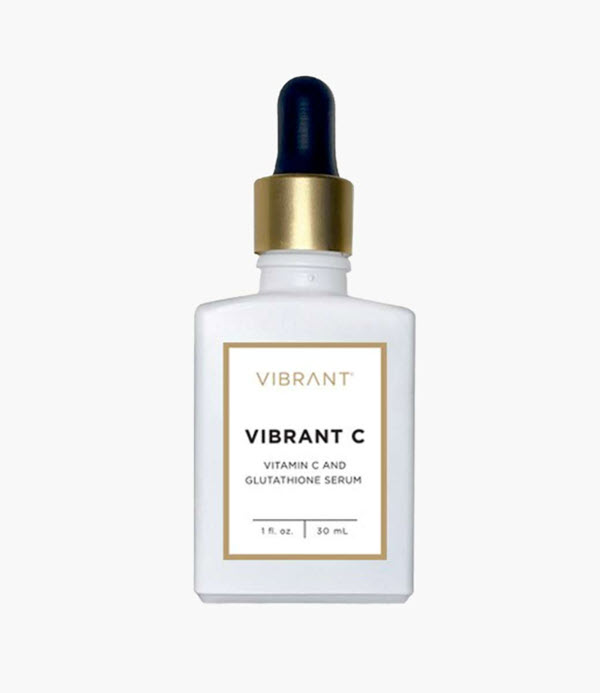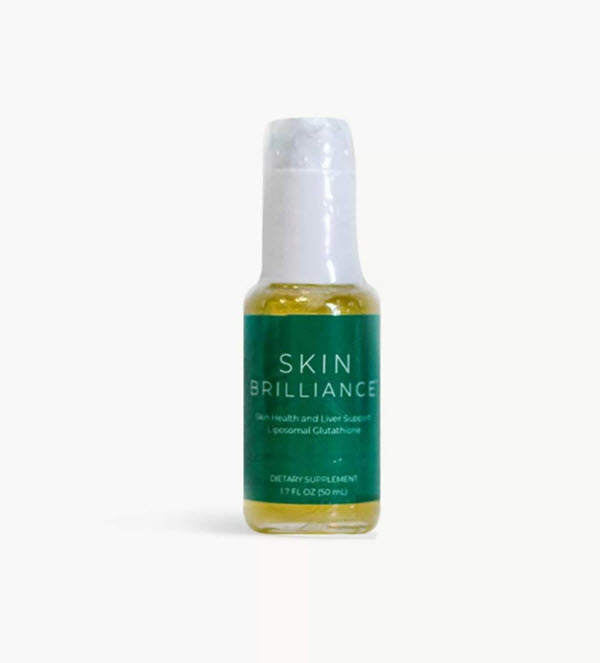Glutathione is a skincare powerhouse known for its wide range of beneficial effects, from skin rejuvenation to the reduction of inflammation. This potent antioxidant also addresses discoloration and hyperpigmentation issues, such as dark spots and melasma, restoring the skin’s natural radiance.
Read about glutathione’s skin-lightening effects and learn how to maximize its potential while reducing potential risks.

Can Glutathione Be Used for Skin Lightening?
Glutathione (GSH) inhibits melanin production and produces a brighter or more balanced complexion. Depending on the skin issue and severity, this naturally occurring antioxidant is administered topically, orally, and intravenously. Its versatility and effectiveness make it a star ingredient of many rejuvenating and anti-inflammatory products.
However, glutathione’s long-term safety and efficacy are a part of ongoing research as scientific evidence stems from smaller clinical trials.
The Benefits of Using Glutathione for Skin Lightening
This skin-lightening agent can address pigmentation issues caused by hormonal imbalances, sun damage (i.e., photoaging), premature aging, and skin pollution.
It offers many health benefits and alleviates the following skin problems:
- Hyperpigmentation – Evens skin tone, reduces dullness, and enhances natural glow.
- Dark spots – Fades sunspots or liver spots caused by excessive sun exposure.
- Age spots – Reduces the first signs of aging, like age spots and early wrinkles.
- Melasma – Reduces dark, discolored patches and freckle-like spots.
- Acne scars – Promotes wound healing and fades post-inflammatory acne scars, blemishes, and uneven complexion.
- Skin inflammation – Decreases inflammatory discoloration, redness, and blotchy patches by neutralizing free radicals.
The Risks of Using Glutathione for Skin Lightening
Glutathione may cause health complications if used improperly or for an extended period. These effects depend on individual response, skin issues, genetics, environmental factors, and the administration method. GSH injectables are not FDA-approved for skin lightening and carry more risks.
The following is a list of potential side effects:
- Allergic reactions
- Infections
- Rashes
- Itchiness
- Redness
- Swelling
- Gastrointestinal problems (e.g., bloating, abdominal pain)
- Kidney dysfunction
- Liver issues
- Asthma
- Lower zinc levels
- Increased risk of skin cancer
- Thyroid damage
- Ochronosis (blue-black or gray-blue discoloration)
- Toxicity
Note: Learn how to take glutathione effectively to minimize potential complications.
How to Use Glutathione for Skin Lightening
You can elevate glutathione levels through lifestyle adjustments or a medical treatment tailored to address specific pigmentation issues.
To boost GSH levels naturally, consume more sulfur- and selenium-rich foods, increase vitamin C intake, exercise regularly, and get enough sleep. To achieve effective skin-brightening results, consider the following three options.
1. Topical Glutathione
Apply a glutathione-based product (e.g., cream, serum, mask) daily and consistently to target dark spots, patches, and discoloration. Over-the-counter products contain 1-2% glutathione and may include ingredients that boost glutathione’s antioxidant activity, such as ascorbic acid, ferulic acid, and tocopherol.
Topically applied glutathione is a localized treatment that addresses only the affected areas. You can complement it with oral supplementation to enhance its effectiveness and achieve overall skin brightening.
Our experts recommend Vibrant C Serum, a blend of potent skin-lightening agents that support one another. It contains bioavailable vitamin C, glutathione, other antioxidants, and collagen-boosting amino acids.

2. Oral Glutathione
Dietary supplements provide systemic treatment by enhancing GSH levels, increasing absorption, and promoting overall detoxification. Experts recommend taking 500 mg of glutathione daily via the orobuccal route (letting the capsule dissolve inside your cheeks) for optimal skin-lightening effects.
For resistant or recurring melasma, dermatologists suggest pairing oral glutathione with a topical or cosmetic treatment, such as a chemical peel or microneedling. Consult your doctor about adding other melanin inhibitors to your therapy, including retinol, kojic acid, and arbutin.
We recommend Vibrant Skin Brilliance, a supplement that supports skin and liver health, brightens the complexion, and combats oxidative stress from external pollutants and metabolic processes.

3. Glutathione Injections
Glutathione administered intravenously offers many health benefits, balances skin tone, and rejuvenates the skin. IV therapy helps brighten the skin by inhibiting the activity of tyrosinase, the enzyme responsible for melanin production. The result of IV glutathione is glowing skin and a brighter complexion.
The U.S. Food and Drug Administration has not yet approved glutathione injections for skin lightening . However, many people report positive results, suggesting it may be an effective skin-lightening option.
Discuss different skin-lightening treatment strategies with a healthcare professional to determine if glutathione injections are a safe and suitable option for you.
What to Expect from Glutathione Skin Lightening?
During the consultation, a specialist assesses your medical record, skin type, and skin issue to determine the adequate glutathione treatment. Depending on the desired outcome, they can suggest a single or a combination of treatments.
The first results may appear after four to five weeks and become more noticeable after months of consistent use. The results vary depending on skin type, genetics, and overall health.
The speed of the onset of results depends on your skin tone:
- Light-medium brown – One to three months.
- Dark brown – Three to six months.
- Very dark – Six to twelve months.
- Black skin – Eighteen months.
However, glutathione skin lightening is not permanent regardless of the treatment’s effectiveness. The skin will gradually revert to its original tone if you do not maintain the results with your chosen topical products, supplements, or cosmetic treatments.
Follow the product instructions carefully, as the recommended dosage typically decreases during maintenance.
Conclusion
Glutathione restores the skin’s natural radiance and brightens skin tone. This “master antioxidant” is in high demand despite its debatable skin-lightening capacity. Patient evidence confirms its effectiveness in achieving a more youthful and lighter complexion. Learning how to harness its skin benefits by combining treatments will help you attain goals faster.
If you have more questions about hyperpigmentation and glutathione, contact our friendly team at Vibrant Skin Bar.


